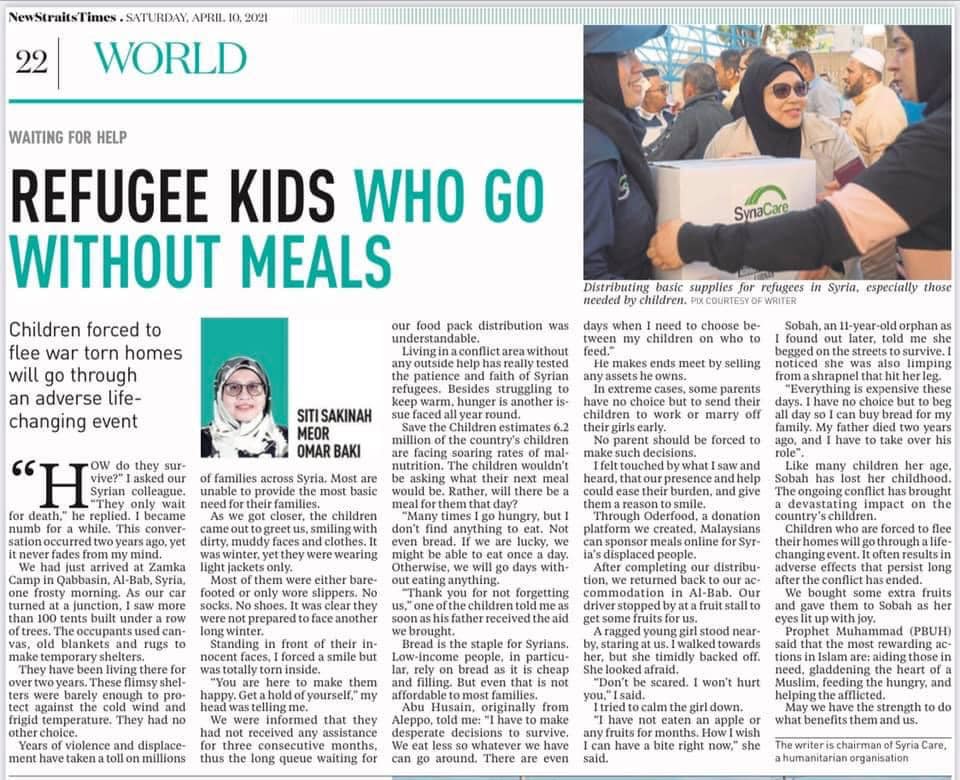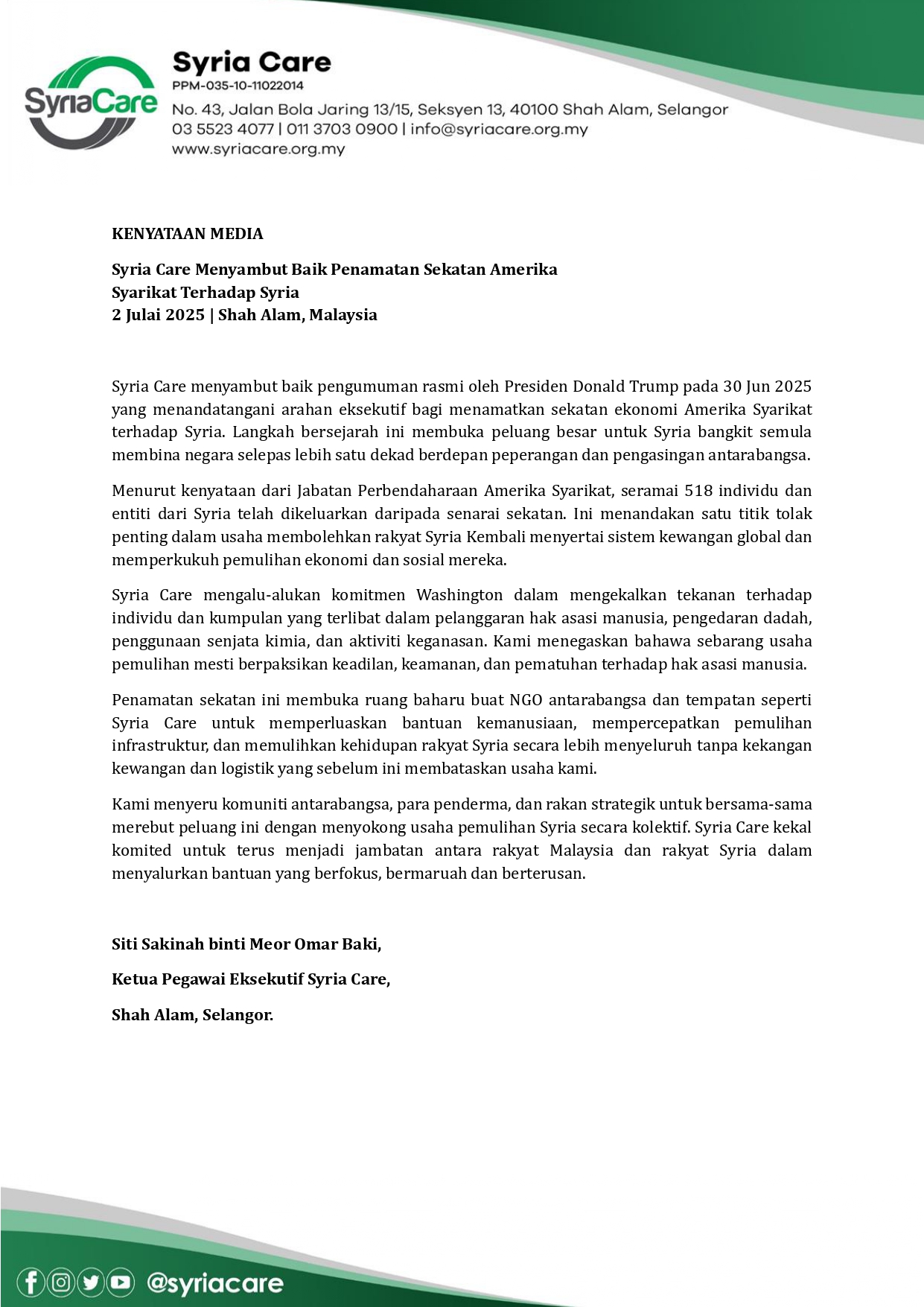“HOW do they survive?” I asked our Syrian colleague. “They only wait for death,” he replied. I became numb for a while. This conversation occurred two years ago, yet it never fades from my mind.
We had just arrived at Zamka Camp in Qabbasin, Al-Bab, Syria, one frosty morning. As our car turned at a junction, I saw more than 100 tents built under a row of trees. The occupants used canvas, old blankets and rugs to make temporary shelters.
They have been living there for over two years. These flimsy shelters were barely enough to protect against the cold wind and frigid temperature. They had no other choice.
Years of violence and displacement have taken a toll on millions of families across Syria. Most are unable to provide the most basic need for their families.
As we got closer, the children came out to greet us, smiling with dirty, muddy faces and clothes. It was winter, yet they were wearing light jackets only.
Most of them were either barefooted or only wore slippers. No socks. No shoes. It was clear they were not prepared to face another long winter.
Standing in front of their innocent faces, I forced a smile but was totally torn inside.
“You are here to make them happy. Get a hold of yourself,” my head was telling me.
We were informed that they had not received any assistance for three consecutive months, thus the long queue waiting for our food pack distribution was understandable.
Living in a conflict area without any outside help has really tested the patience and faith of Syrian refugees. Besides struggling to keep warm, hunger is another issue faced all year round.
Save the Children estimates 6.2 million of the country’s children are facing soaring rates of malnutrition. The children wouldn’t be asking what their next meal would be. Rather, will there be a meal for them that day?
“Many times I go hungry, but I don’t find anything to eat. Not even bread. If we are lucky, we might be able to eat once a day. Otherwise, we will go days without eating anything.
“Thank you for not forgetting us,” one of the children told me as soon as his father received the aid we brought.
Bread is the staple for Syrians. Low-income people, in particular, rely on bread as it is cheap and filling. But even that is not affordable to most families.
Abu Husain, originally from Aleppo, told me: “I have to make desperate decisions to survive. We eat less so whatever we have can go around. There are even days when I need to choose between my children on who to feed.”
He makes ends meet by selling any assets he owns.
In extreme cases, some parents have no choice but to send their children to work or marry off their girls early.
No parent should be forced to make such decisions.
I felt touched by what I saw and heard, that our presence and help could ease their burden, and give them a reason to smile.
Through Oderfood, a donation platform we created, Malaysians can sponsor meals online for Syria’s displaced people.
After completing our distribution, we returned back to our accommodation in Al-Bab. Our driver stopped by at a fruit stall to get some fruits for us.
A ragged young girl stood nearby, staring at us. I walked towards her, but she timidly backed off. She looked afraid.
“Don’t be scared. I won’t hurt you,” I said.
I tried to calm the girl down.
“I have not eaten an apple or any fruits for months. How I wish I can have a bite right now,” she said.
Sobah, an 11-year-old orphan as I found out later, told me she begged on the streets to survive. I noticed she was also limping from a shrapnel that hit her leg.
“Everything is expensive these days. I have no choice but to beg all day so I can buy bread for my family. My father died two years ago, and I have to take over his role”.
Like many children her age, Sobah has lost her childhood. The ongoing conflict has brought a devastating impact on the country’s children.
Children who are forced to flee their homes will go through a life-changing event. It often results in adverse effects that persist long after the conflict has ended.
We bought some extra fruits and gave them to Sobah as her eyes lit up with joy.
Prophet Muhammad (PBUH) said that the most rewarding actions in Islam are: aiding those in need, gladdening the heart of a Muslim, feeding the hungry, and helping the afflicted.
May we have the strength to do what benefits them and us.
Siti Sakinah Meor Omar Baki
Chairman of Syria Care




![Kenyataan Media Syria Menuju Masa Depan Lebih Stabil Dengan Gabungan Sdf & Kerajaan Baru[1] Page 0001](https://syriacare.org.my/wp-content/uploads/2025/03/KENYATAAN-MEDIA-SYRIA-MENUJU-MASA-DEPAN-LEBIH-STABIL-DENGAN-GABUNGAN-SDF-KERAJAAN-BARU1_page-0001-scaled.jpg)